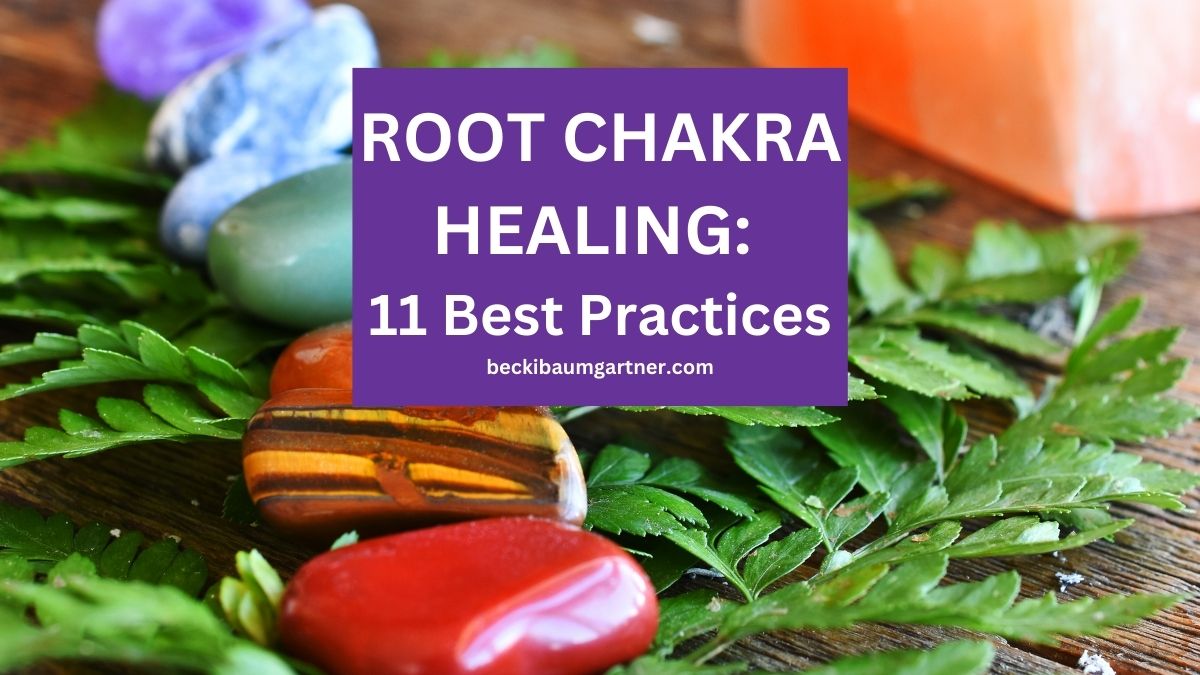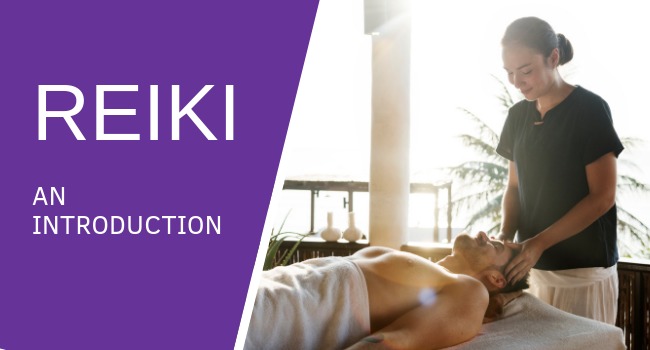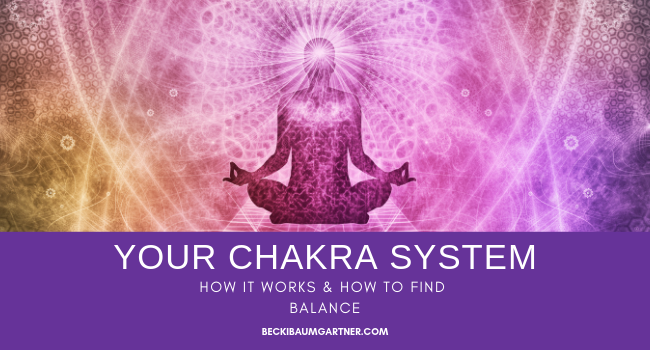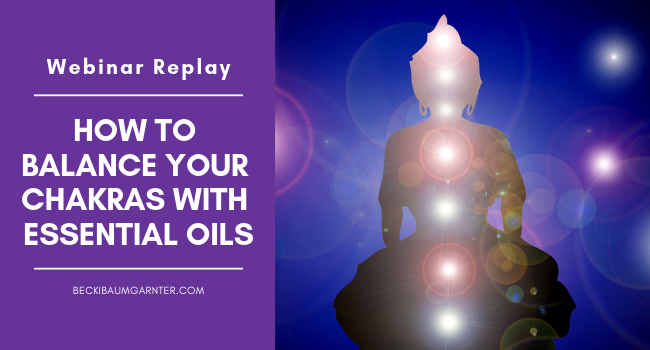What is the Root Chakra?
According to Hindu and Buddhist traditions, your root chakra, the “Muladhara” chakra, is the first of the seven chakras in the human body.
It resides at the base of the spine, near the coccyx or tailbone.
Your root chakra connects energetically to the “earth element” and is the foundation of the entire chakra system.
It is also energetically connected to the color red and governs our sense of grounding, stability, and security.
When your root chakra is open and balanced, you feel grounded, safe, and connected to your physical body and the earth.
Conversely, you may experience insecurity, fear, and instability when your root chakra is underactive or overactive.
What Does the Root Chakra Do?
Your root chakra is the foundation of your entire chakra system. It governs your body’s lower region, including the legs, feet, tailbone, and reproductive organs.
It is responsible for grounding and connecting you to the earth, providing you with feelings of stability, security, and survival.
The root chakra governs your basic needs, including food, shelter, water, safety, and primal instincts, such as fight-or-flight responses.
When your root chakra is balanced and functioning correctly, it helps you feel secure, grounded, and supported. It allows you to move confidently through life and face any challenges.
In addition to its physical aspects, your root chakra has emotional and spiritual significance.
It relates to trust, safety, belonging, and the ability to feel present in the moment and connect with your body.
When your root chakra is out of balance, it can lead to feelings of insecurity, anxiety, and disconnection from the physical world.
Root Chakra Imbalances
A root chakra imbalance occurs when the energy flow in the root chakra is blocked, excessive, or deficient, leading to physical, emotional, or spiritual issues.
An imbalance in the root chakra can manifest in various ways and affect different aspects of life.
Overactive Root Chakra Symptoms
While having an open root chakra is generally considered beneficial, having it overactive can cause some symptoms that may be uncomfortable or problematic.
Here are some signs you may have an excessively open root chakra:
- Feeling disconnected from your body or the physical world
- Difficulty concentrating or focusing
- Overeating or having unhealthy eating habits
- Being overly materialistic or obsessed with possessions
- Struggling to establish boundaries or feeling overwhelmed by others’ energy
- Feeling excessively fearful or anxious, particularly about safety or survival
- Being resistant to change or feeling stuck in life
- Being prone to addiction or substance abuse
- Being overly rigid or inflexible in your beliefs or behavior
Underactive Root Chakra Symptoms
When your root chakra is underactive, you experience various physical, emotional, and spiritual symptoms.
Here are some common symptoms of an underactive root chakra:
- Physical symptoms: chronic lower back pain, sciatica, leg or feet issues, constipation, bladder or bowel problems, and autoimmune disorders.
- Emotional symptoms: feelings of anxiety, fear, restlessness, insecurity, mistrust, or depression, lack of motivation or drive, feeling disconnected from others, and having low self-esteem.
- Behavioral symptoms: feeling ungrounded or spacey, procrastination or being disorganized, lack of focus or discipline, feeling lost or lack of direction, and a tendency to isolate yourself.
- Spiritual symptoms: feeling disconnected from nature or spirituality, lacking purpose or passion, and lacking connection to a higher power.
Luckily, there are many things you can incorporate into your daily life to heal and balance your root chakra.
All you need to do is choose a few and make them habits!
#1 Heal Your Root Chakra Using Food
Certain foods help balance and support the root chakra in general because they provide nourishment and energy to this body area.
These foods will help your root chakra regardless of whether it’s overactive or underactive.
Here are some foods that can help balance and heal your root chakra:
- Root vegetables: such as carrots, potatoes, beets, turnips, and radishes are grounding and help to anchor the body.
- Protein-rich foods: such as meat, fish, beans, and legumes, are essential for building and strengthening the body.
- Red-colored foods: such as red peppers, tomatoes, and strawberries, are associated with the color of the root chakra and can help stimulate and energize this area.
- Spices: such as ginger, turmeric, and cumin, can help to promote digestion and balance the body’s energy.
- Healthy fats: like coconut oil, olive oil, and avocados, provide sustained energy and nourishment to the body.
- Mineral-rich foods: sea salt, black beans, and leafy greens help replenish essential minerals needed for grounding and support.
Food for an Overactive Root Chakra
If you have an overactive root chakra, you must focus on eating foods to help balance and calm this chakra.
Here are some foods to help balance an overly active root chakra:
- Cooling foods: cucumber, watermelon, and mint help to soothe and calm the body.
- Complex carbohydrates: whole grains, brown rice, and quinoa provide sustained energy and help to balance blood sugar levels.
- Leafy greens: spinach, kale, and collard greens, are rich in minerals and promote grounding and stability.
- Herbal teas: chamomile, lavender, and valerian root can help to promote relaxation and calm.
- Root vegetables: sweet potatoes, carrots, and parsnips anchor the body and provide stability.
- Healthy fats: such as coconut oil, ghee, and avocado, can provide sustained energy and nourishment to the body.
Food for an Underactive Root Chakra
If you have an underactive root chakra, you must focus on eating foods that can help balance and energize this chakra.
Here are some foods to help balance an underactive root chakra:
- Red-colored foods: red peppers, beets, and strawberries are associated with the color of the root chakra and stimulate and energize this area.
- Root vegetables: carrots, potatoes, and radishes are grounding and anchor the body.
- Protein-rich foods: meat, fish, beans, and legumes, are essential for building and strengthening the body.
- Spices: ginger, turmeric, and cumin help to promote digestion and balance the body’s energy.
- Healthy fats: coconut oil, olive oil, and avocados provide sustained energy and nourishment to your body.
- Mineral-rich foods: such as sea salt, black beans, and leafy greens, can help to replenish essential minerals that are needed for grounding and support.
#2 Heal Your Root Chakra Using Meditation & Affirmations
Meditation can be a powerful tool for healing the root chakra. It helps calm your mind, reduce stress and anxiety, and promote a sense of grounding and stability. Here are some ways meditation can heal your root chakra:
- Increased awareness: Through meditation, you can develop a greater awareness of your thoughts, emotions, and physical sensations, which can help you identify any imbalances in your root chakra.
- Deep relaxation: Meditation relaxes the body, reduces stress and anxiety, and balances the root chakra.
- Mind-body connection: By focusing on the breath and the body during meditation, you can strengthen the relationship between the mind and body, essential for promoting overall health and well-being.
- Visualization: Guided meditations that focus on visualizing a strong and healthy root chakra can help promote healing and balance in this area.
- Affirmations: Incorporating positive affirmations related to the root chakra into your meditation practice can help to reprogram your mind and promote a sense of security and stability.
Meditation for an Overactive Root Chakra
If you have an excessively open root chakra, focusing on meditation practices that promote grounding, stability, and balance is essential.
Here is a simple meditation that can be helpful for an excessively open root chakra:
- Find a comfortable seated position: Sit on a cushion or a chair with your spine straight and your feet flat on the ground.
- Focus on your breath: Close your eyes and focus on your breath. Then, take a few deep, slow breaths, and allow your breath to return to its natural rhythm.
- Visualize roots: Visualize roots growing from the base of your spine, deep into the earth. Imagine these roots anchoring you firmly to the ground and providing stability and security.
- Use affirmations: Repeat affirmations related to the root chakra, such as “I am grounded and secure” or “I am connected to the earth and its energy.”
- Stay present: Allow yourself to stay present in the moment, focusing on your breath and the sensations in your body. If your mind begins to wander, gently bring it back to the present moment.
- End with gratitude: When ready, take a few deep breaths and slowly open your eyes. Then, take a moment to express gratitude for your root chakra and its role in supporting your physical and emotional health.
You can do this meditation for as little as 5-10 minutes per day, and repeat it as often as needed to promote balance and healing in an excessively open root chakra.
Meditation & Affirmations for an Underactive Root Chakra
If you have a blocked root chakra, focusing on meditation practices that promote grounding, stability, and release of any negative energy or emotions contributing to the blockage is essential.
Here is a simple meditation to help balance a blocked root chakra:
- Find a comfortable seated position: Sit on a cushion or a chair with your spine straight and your feet flat on the ground.
- Focus on your breath: Close your eyes and focus on your breath. Take a few deep, slow breaths, then allow your breath to return to its natural rhythm.
- Visualize a red light: Visualize a bright red light at the base of your spine, where the root chakra is located. Imagine this light growing brighter with each inhale, filling the area with warmth and energy.
- Release negative emotions: As you exhale, imagine any negative emotions or energy being released from the root chakra and dissolving into the earth.
- Affirmations: Repeat affirmations related to the root chakra, like “I am safe and secure” or “I trust in the abundance of the universe.”
- Stay present: Allow yourself to stay present in the moment, focusing on your breath and the sensations in your body. If your mind begins to wander, gently bring it back to the present moment.
- End with gratitude: When ready, take a few deep breaths and slowly open your eyes. Take a moment to express gratitude for your root chakra and its role in supporting your physical and emotional health.
You can do this meditation for as little as 5-10 minutes per day, and repeat it as often as needed to promote balance and healing in your blocked root chakra.
#3 Heal Your Root Chakra Using a Mantra
Mantras are a powerful tool for healing and balancing the root chakra.
A mantra is a word, sound, or phrase repeated to help focus the mind and promote healing energy.
Here are some ways that mantras can help heal your root chakra:
- Sound vibrations: Mantras create vibrations that stimulate and balance the root chakra’s energy. The root chakra is connected to the earth element, so grounding and stabilizing mantras containing the ” LAM ” sound can be particularly effective.
- Focus and intention: Repeating a mantra with focus and intention can help to clear any blockages or stagnant energy in the root chakra. It can also help strengthen the connection between the root chakra and the earth, promoting safety, security, and stability.
- Affirmations: Mantras often contain positive affirmations related to the root chakra, such as “I am safe” or “I am grounded.” Repeating these affirmations can help shift negative thought patterns or beliefs that may contribute to a blocked or imbalanced root chakra.
Here is a simple mantra that can help heal the root chakra:
“LAM” (pronounced like “lahm”)
To use this mantra, sit comfortably and repeat the ” LAM ” sound silently or aloud. Then, focus on the base of your spine and imagine the sound vibrations filling the area with warmth and energy.
You can repeat this mantra for as little as 5-10 minutes daily or as often as needed to promote balance and healing in your root chakra.
Mantra for an Overactive Root Chakra
If you have an overactive root chakra, focusing on mantras that promote balance and calmness is essential.
Here is a simple mantra that can be helpful for an overactive root chakra:
“I am grounded and balanced.”
This mantra emphasizes the importance of balance and grounding, which can help to regulate an overactive root chakra.
By repeating this mantra, you can shift your focus towards feelings of stability and promote a sense of calmness.
To use this mantra, sit comfortably and repeat, “I am grounded and balanced,” silently or aloud.
Focus on the base of your spine and imagine the feelings of grounding and balance spreading throughout your body.
You can repeat this mantra for as little as 5-10 minutes daily or as often as needed to promote balance and healing in your root chakra.
Mantra for an Underactive Root Chakra
If you have a blocked root chakra, focusing on mantras that promote grounding, stability, and connection is essential.
Here is a simple mantra that can be helpful for a blocked root chakra:
“I am safe and secure.”
This mantra emphasizes safety and security, which are essential for promoting a healthy root chakra.
Repeating this mantra can shift your focus from fear or anxiety and promote stability and grounding.
To use this mantra, sit comfortably and repeat “I am safe and secure” silently or aloud.
Focus on the base of your spine and imagine the feelings of safety and security spreading throughout your body.
You can repeat this mantra for as little as 5-10 minutes daily or as often as needed to promote balance and healing in your root chakra.
#4 Heal Your Root Chakra Using Essential Oils
Essential oils are an excellent tool for supporting and healing your root chakra.
Certain essential oils have grounding and calming properties that balance and heal the root chakra.
Here are some essential oils that are commonly used to heal and balance the root chakra:
- Patchouli: has grounding and calming properties that can help to balance an overactive root chakra.
- Cedarwood: has a grounding and earthy scent that can promote stability and security.
- Vetiver: has a deep, grounding scent that can calm an overactive root chakra.
- Frankincense: has a calming and grounding effect that can promote spiritual connection and support.
- Ginger: has warming and stimulating properties to activate and balance the root chakra.
To use essential oils to heal the root chakra, add a few drops to a diffuser or inhale the scent directly from the bottle.
You can also dilute the essential oil in a carrier oil and apply it to the soles of your feet, the base of your spine, or the lower abdomen to promote grounding and healing in the root chakra.
As with any complementary healing modality, it’s important to use essential oils safely and consult a qualified practitioner if you have any concerns or medical conditions.
When inhaled or applied topically, essential oils can affect the limbic system, the part of the brain responsible for emotions, memory, and mood.
The limbic system is connected to the root chakra and influences its functioning.
Essential Oils for an Overactive Root Chakra
When the root chakra is overactive, using essential oils that have a grounding and calming effect is helpful.
Here are some essential oils that help to balance an overactive root chakra:
- Vetiver: has a deep, grounding scent to help to calm an overactive root chakra.
- Cedarwood: has a grounding and earthy scent that can promote stability and security.
- Patchouli: has grounding and calming properties that can help to balance an overactive root chakra.
- Frankincense: has a calming and grounding effect that can promote spiritual connection and support.
- Sandalwood: has a grounding and centering effect that can help to calm an overactive root chakra.
To use essential oils, add a few drops to a diffuser or inhale the scent directly from the bottle.
You can also dilute the essential oil in a carrier oil and apply it to the soles of your feet, the base of your spine, or the lower abdomen to promote grounding and healing in the root chakra.
Essential Oils for an Overactive Root Chakra
When the root chakra is blocked or imbalanced, it can be helpful to use essential oils with a stimulating and activating effect. Here are some essential oils that can help to open and balance a blocked root chakra:
- Black Pepper: has a warming and stimulating effect that can help to activate and balance the root chakra.
- Ginger: has warming and stimulating properties that can help to activate and balance the root chakra.
- Rosemary: has a stimulating and energizing effect that can help to promote circulation and balance in the root chakra.
- Cinnamon: has a warming and stimulating effect that can help to promote circulation and balance in the root chakra.
- Clove: has a stimulating and energizing effect that can help to promote circulation and balance in the root chakra.
To use essential oils, add a few drops to a diffuser or inhale the scent directly from the bottle.
You can also dilute the essential oil in a carrier oil and apply it to the soles of your feet, the base of your spine, or the lower abdomen to promote grounding and healing in the root chakra.
#5 Heal Your Root Chakra Using Yoga
Yoga can be a very effective way to help balance and heal the root chakra. Here are some ways that yoga helps:
- Physical grounding: Yoga poses that emphasize grounding can help to connect you with the earth and promote feelings of stability and security. Poses like Mountain Pose (Tadasana), Tree Pose (Vrikshasana), and Warrior I (Virabhadrasana I) can be especially helpful.
- Hip opening: The root chakra is associated with the hips, so hip-opening yoga poses can help release tension and promote energy flow in this area. Poses like Pigeon Pose (Eka Pada Rajakapotasana) and Butterfly Pose (Baddha Konasana) can be very effective.
- Breathwork: Yoga breathing techniques, or pranayama, can stimulate or calm the root chakra. For example, deep, slow belly breathing can promote grounding and relaxation, while rapid, forceful breathing can promote activation and energy flow.
- Mindfulness: Yoga practice can help to cultivate a sense of presence and awareness, which can be especially helpful for healing the root chakra. Mindfulness meditation or focused awareness of the root chakra during yoga can promote healing and balance.
Yoga can be an excellent tool for balancing and healing the root chakra.
Yoga Poses for an Overactive Root Chakra
When the root chakra is overactive, focusing on yoga poses that promote grounding and stability is essential.
Here are some yoga poses to help balance an overactive root chakra:
- Child’s Pose (Balasana): This pose helps to promote a sense of surrender and relaxation. From kneeling, lower your forehead to the floor, and stretch your arms out in front of you.
- Forward Fold (Uttanasana): This pose helps to calm the nervous system and promote grounding. Stand with your feet hip-distance apart and fold forward from the hips, bringing your hands to the floor or a block.
- Warrior II (Virabhadrasana II): This pose helps to promote stability and strength. From a lunge position, turn your back foot out and extend your arms to the sides, gazing over your front hand.
- Tree Pose (Vrikshasana): This pose helps to promote balance and stability. Stand on one leg and place the sole of the other foot against the inner thigh or calf. Bring your hands to the prayer position at your heart center.
- Bridge Pose (Setu Bandha Sarvangasana): This pose helps to promote grounding and stability. Lie on your back with your knees bent and feet hip-distance apart. Then, lift your hips up towards the ceiling and interlace your hands underneath your body.
Yoga Poses for an Underactive Root Chakra
When the root chakra is underactive, it’s essential to focus on yoga poses that help to stimulate and energize the area. Here are some yoga poses to help balance an underactive root chakra:
- Garland Pose (Malasana): This pose helps to promote grounding and openness in the hips. From a squatting position, bring your hands to your heart center and press your elbows against your inner knees.
- Warrior I (Virabhadrasana I): This pose helps to promote grounding and strength. Turn your back foot out from a lunge position and lift your arms up towards the ceiling.
- Downward-Facing Dog (Adho Mukha Svanasana): This pose helps to promote energy flow and grounding. From a tabletop position, lift your hips up toward the ceiling and press your hands and feet into the floor.
- Wide-Legged Forward Fold (Prasarita Padottanasana): This pose helps to promote grounding and release in the hips and lower back. Stand with your feet wide apart and fold forward from the hips, bringing your hands to the floor or a block.
- Corpse Pose (Savasana): This pose helps to promote relaxation and release. Lie on your back with your arms and legs relaxed, and allow your body to sink into the floor.
#6 Heal Your Root Chakra Using Color
Colors can help heal the root chakra by stimulating the energy associated with that chakra.
The root chakra is associated with the color red, which is a grounding and energizing color.
You can help stimulate and balance your root chakra’s energy by surrounding yourself with red or other grounding colors.
Here are some ways you can use colors to help heal your root chakra:
- Wear red clothing or accessories: Wearing red clothing or accessories can help to stimulate the energy of your root chakra and promote grounding and stability.
- Use red crystals or gemstones: Crystals and gemstones that are red in color, such as garnet, ruby, or red jasper, can help to stimulate the energy of your root chakra.
- Surround yourself with red decor: Decorating your space with red accents or accessories can help to promote grounding and stability.
- Visualize the color red: Visualizing the color red during meditation or visualization practices can help to stimulate the energy of your root chakra and promote balance and harmony.
Colors for an Overactive Root Chakra
If you have an overactive root chakra, you must focus on calming and balancing colors.
While the root chakra is associated with the color red, too much stimulation from this color can exacerbate an already overactive chakra.
Here are some colors that may be beneficial for an overactive root chakra:
- Earth tones: Earthy colors like brown, beige, and taupe can help to promote grounding and stability without overstimulating the root chakra.
- Cool tones: Cool colors like blue and green can help to promote balance and calmness in an overactive root chakra.
- White: White is a pure, calming color that can help promote clarity and balance in the root chakra’s energy.
Colors for an Underactive Root Chakra
For an underactive root chakra, it’s essential to focus on colors that can help stimulate and energize its energy.
Here are some colors that may be beneficial for a blocked root chakra:
- Red: As the root chakra is associated with the color red, incorporating this color into your surroundings can help to stimulate and energize the energy of the root chakra.
- Bright and warm colors: Bright and warm colors like orange, yellow, and pink can help to promote warmth, energy, and a sense of safety and security in a blocked root chakra.
- Lighter colors: Lighter colors like white and pale pink can help promote a sense of purity and clarity in the root chakra’s energy.
#6 Heal Your Root Chakra Using Herbs
Herbs can be used to help heal the root chakra by promoting balance and harmony in the energy of this chakra.
Different herbs have different properties that can benefit the root chakra, such as promoting grounding, stability, and physical health.
Here are some ways that herbs can be used to heal the root chakra:
- Aromatherapy: Using essential oils derived from herbs that have properties that promote grounding and balance, such as patchouli, cedarwood, or vetiver, can be beneficial for healing an imbalanced root chakra. Use the oils in a diffuser or add to a carrier oil and apply topically. They are great for massage!
- Herbal teas: Drinking herbal teas made from herbs that have properties that promote grounding and balance, such as ginger, turmeric, or ginseng, can be beneficial for healing an imbalanced root chakra. You can enjoy tea throughout the day for maximum benefit.
- Herbal remedies: You can take herbal supplements or tinctures to promote grounding and balance in the root chakra. Some herbs that may benefit the root chakra include ashwagandha, rhodiola, or maca.
Herbs for an Overactive Root Chakra
You will benefit from herbs promoting grounding and balance if you have an overactive root chakra. Here are some herbs that can help to balance an overactive root chakra:
- Ashwagandha: This herb has calming and grounding effects, and it can help to balance an overactive root chakra by promoting relaxation and reducing anxiety.
- Valerian root: This herb has sedative and calming effects, and it can help to promote balance in an overactive root chakra by reducing nervousness and promoting relaxation.
- Passionflower: This herb has calming and relaxing effects, and it can help to balance an overactive root chakra by reducing anxiety and promoting relaxation.
- Lavender: This herb has soothing and calming effects, and it can help to promote balance in an overactive root chakra by reducing stress and promoting relaxation.
Herbs for an Underactive Root Chakra
You will benefit from herbs promoting grounding and stability if you have an underactive root chakra.
Here are some herbs that can help to balance an underactive root chakra:
- Ginger: This warming herb stimulates circulation and promotes a sense of groundedness, making it an excellent choice for balancing a blocked root chakra.
- Turmeric: This vibrant yellow herb has grounding and energizing properties, and it can help to promote balance and stability in a blocked root chakra.
- Licorice root: This sweet-tasting herb promotes balance and harmony, making it a great choice for balancing a blocked root chakra.
- Dandelion root: This bitter herb supports liver function and promotes detoxification, and it can help to clear energetic blockages in the root chakra.
#7 Heal Your Root Chakra Using Exercise
Exercise can help heal the root chakra by promoting physical grounding, stability, emotional balance, and resilience. The root chakra is connected to the physical body, so engaging in physical exercise promotes the flow of energy through the root chakra, strengthening the connection between the body and the earth.
Exercise for an Overactive Root Chakra
If you have an overactive root chakra, you will benefit from engaging in exercises that promote relaxation and balance.
Here are some forms of exercise that can help to balance an overactive root chakra:
- Restorative yoga: Restorative yoga is a gentle form focusing on relaxation and deep breathing. It can help to calm an overactive root chakra and promote a sense of groundedness and stability.
- Tai chi: Tai chi is a gentle form of martial arts that focuses on slow, flowing movements and deep breathing. It can help to promote relaxation and balance in the body and can be particularly beneficial for balancing an overactive root chakra.
- Swimming: Swimming is a low-impact form of exercise that can help to promote relaxation and balance in the body. It can also help to promote physical grounding and stability.
- Walking in nature: Walking in nature is a simple and accessible exercise that promotes relaxation and balance in the body. It also promotes a sense of connection with the earth, which can be particularly beneficial for balancing an overactive root chakra.
Exercise for an Underactive Root Chakra
If you have an underactive root chakra, you will benefit from engaging in exercises that help to promote circulation and energy flow in the lower body.
Here are some types of exercise that can help to balance a blocked root chakra:
- Yoga: Yoga poses that focus on the lower body, such as seated forward folds and hip openers, can help to promote circulation and energy flow in the root chakra area. This can help to release any blockages and promote balance in the chakra.
- High-intensity interval training (HIIT): HIIT exercises can help to increase blood flow and promote energy flow throughout the body. This can be particularly beneficial for releasing blockages in the root chakra and promoting balance in the system.
- Dancing: Dancing can help to promote circulation and energy flow throughout the body and can be particularly beneficial for releasing any blockages in the lower body. Connecting with your body and promoting overall well-being can be fun and enjoyable.
- Hiking: Hiking is a form of exercise that involves walking in nature, which can be particularly beneficial for grounding and promoting balance in the root chakra. It can also help to promote physical fitness and overall well-being.
#8 Heal Your Root Chakra Using Music and Sound
Music and sound can powerfully affect your body and mind and help heal and balance the root chakra. The root chakra energetically connects to the element of earth and is related to feelings of stability, grounding, and safety.
Music and Sounds for an Overactive Root Chakra
An overactive root chakra can cause restlessness, anxiety, and a lack of focus.
Music and sounds that help balance an overactive root chakra ones that promote relaxation, grounding, and stability.
Here are some examples:
- Slow and calming music: Soft, slow, and calming music can help to relax an overactive root chakra. You may want to try listening to classical music, slow jazz, or relaxing instrumental music.
- Nature sounds: The soothing sounds of gentle rain, a babbling brook, or the ocean waves can help to soothe an overactive root chakra. Nature sounds have a calming effect and can help to promote feelings of stability and grounding.
- Binaural beats: Binaural beats are two different sound frequencies played simultaneously to create a specific brainwave pattern, which can help to promote relaxation and balance. Theta binaural beats with a 4-7 Hz frequency can help calm an overactive root chakra.
- Chants and mantras: Chanting or listening to mantras that focus on grounding and stability can help to balance an overactive root chakra. The “Lam” mantra energetically connects to the root chakra and promotes feelings of grounding and stability.
Overall, music and sounds that are calming, grounding, and promote relaxation can help to balance an overactive root chakra.
Experiment with different types of music and sounds to see what works best for you.
Music and Sounds for an Underactive Root Chakra
When the root chakra is blocked, it can result in feelings of fear, insecurity, and disconnection.
Music and sounds that help balance a blocked root chakra promote feelings of safety, security, and stability.
Here are some examples:
- Tribal beats: Drumming and tribal beats can help to promote feelings of groundedness and stability. They can also help to release any pent-up energy and tension in the body, which can be helpful when the root chakra is blocked.
- Nature sounds: Similar to an overactive root chakra, nature sounds can also be helpful for a blocked root chakra. The sound of gentle rain, a babbling brook, or the ocean waves can help soothe and calm the body, promoting feelings of safety and security.
- Singing bowls: Singing bowls produce a variety of tones and vibrations, which can help balance the body’s energy. Root chakra singing bowls are often made of grounding materials such as brass or copper and produce a deep, resonant sound that promotes feelings of safety and security.
- Chants and mantras: Chanting or listening to mantras that focus on grounding and safety can help to balance a blocked root chakra. The “Lam” mantra is associated with the root chakra and promotes feelings of safety and security.
Overall, music and sounds that promote feelings of safety, security, and stability can help balance an underactive root chakra.
Experiment with different types of music and sounds to see what works best for you.
#9 Heal Your Root Chakra Using Crystals
Crystals have vibrational energy that can help balance and heal the body’s energy centers, including the root chakra. The root chakra is associated with the color red and is located at the base of the spine. Crystals that are red or black in color are typically used to balance and heal the root chakra.
Crystals for an Overactive Root Chakra
You can balance an overactive root chakra using crystals that have a calming and grounding effect on the body.
Here are some crystals that are commonly used to balance an overactive root chakra:
- Black Tourmaline: This crystal has a grounding effect and can help to balance the root chakra’s energy.
- Red Jasper: This is a calming and grounding crystal that can help to balance an overactive root chakra.
- Hematite: This grounding crystal helps absorb negative energy and balance an overactive root chakra.
- Smoky Quartz: This crystal helps release negative energy and promote grounding and balance in the root chakra.
Crystals for an Underactive Root Chakra
A blocked root chakra can benefit from crystals that promote grounding and help to release stagnant energy. Here are some crystals that help balance a blocked root chakra:
- Red Garnet: This grounding crystal can help release blocked energy in the root chakra.
- Black Onyx: This crystal helps release negative energy and promote grounding and balance in the root chakra.
- Red Jasper: This is a calming and grounding crystal that can help to balance the root chakra and promote the release of blocked energy.
- Bloodstone: This healing crystal can help promote balance and vitality in the root chakra.
#10 Heal Your Sacral Chakra Using Incense
Incense is often used in spiritual practices and has a calming effect on the mind and body.
In the context of healing the root chakra, incense promotes relaxation and grounding.
Certain scents, such as sandalwood, cedarwood, and patchouli, are particularly beneficial for the root chakra.
These scents help balance and ground the root chakra, helping to release any blockages or stagnant energy.
In addition to promoting relaxation and grounding, burning incense can be a helpful tool for meditation and mindfulness.
Both practices are beneficial for promoting overall chakra balance and healing.
Incense for an Overactive Root Chakra
When the root chakra is overactive, incense that promotes balance and grounding is very helpful.
Some types of incense that can help an overactive root chakra include:
- Sandalwood: This is a popular incense for promoting relaxation and grounding. It helps balance the root chakra and promotes feelings of security.
- Cedarwood: This is another popular incense for promoting grounding and balance. It helps release excess energy in the root chakra and promotes stability.
- Patchouli: This earthy and grounding scent helps balance the root chakra and promotes feelings of stability and security.
- Vetiver: This deep, earthy scent helps ground and balance the root chakra. It benefits those who feel ungrounded or disconnected from their physical body.
Ultimately, the best type of incense for an overactive root chakra will depend on individual preferences and needs. It may be helpful to experiment with different scents to find the one that works best for you.
Incense for an Underactive Root Chakra
When the root chakra is underactive, incense that promotes energy flow and vitality is helpful.
Some types of incense that can help an underactive root chakra include:
- Cinnamon: This warm and spicy scent helps stimulate the root chakra and promote energy flow throughout the body. It also helps promote feelings of security and stability.
- Frankincense: This is a popular incense for promoting relaxation and spiritual awareness. It helps stimulate the root chakra and promotes feelings of groundedness and balance.
- Myrrh: This is another popular incense for promoting spiritual awareness and grounding. It helps stimulate the root chakra and promotes feelings of stability and security.
- Clove: This warm, spicy scent stimulates the root chakra and promotes energy flow. It also helps promote feelings of grounding and stability.
Ultimately, the best type of incense for an underactive root chakra will depend on individual preferences and needs. It may be helpful to experiment with different scents to find the one that works best for you.
#11 Heal Your Root Chakra Using Nature
Nature can help heal the root chakra in several ways:
- Grounding: Spending time in nature, especially walking barefoot on the earth, can help you feel grounded and connected to the earth, which is essential for balancing the root chakra.
- Fresh air: Breathing in the fresh air can help clear stagnant energy and help you feel more energized.
- Greenery: Surrounding yourself with greenery, such as trees and plants, can have a calming effect on the mind and body, reducing stress and anxiety, which can be beneficial for healing the root chakra.
- Water: Being near bodies of water, such as rivers or the ocean, can have a soothing effect on the mind and body, promoting relaxation and helping to release tension and stress.
- Sunlight: Sunlight exposure helps increase vitamin D levels, which is essential for overall health and well-being. It also helps improve mood and energy levels.
By spending time in nature and connecting with the earth, you can help promote the healing of the root chakra and improve your overall well-being.
Nature for an Overactive Root Chakra
Nature can help balance an overactive root chakra by providing grounding energy.
Walking barefoot on the ground or grass, spending time in a natural environment like a park or forest, and gardening are all activities that can help you connect with the earth and bring balance to an overactive root chakra.
Spending time near water like a river or ocean or incorporating water sounds like ocean waves or rainfall can also help soothe an overactive root chakra.
Nature for the Underactive Root Chakra
Nature can help balance an underactive root chakra by providing energy and stimulation.
Walking barefoot on the ground or grass, spending time in natural environments like parks or forests, and gardening are all activities that can help you connect with the earth and bring energy to an underactive root chakra.
Additionally, incorporating bright and vibrant colors like flowers or birds or listening to lively sounds like birds chirping or rustling leaves can also help stimulate an underactive root chakra.
Sunlight is also beneficial, as it provides warmth and energy.
In conclusion, the root chakra is an essential energy center that supports our foundation and grounding.
When your root chakra is balanced, you feel secure, stable, and confident in yourself and your abilities. However, when your root chakra is underactive or overactive, you may experience physical, emotional, and mental imbalances.
Fortunately, various methods can help heal the root chakra, including meditation, yoga, essential oils, crystals, music, incense, and leisure time in nature.
Incorporating these practices into our daily routine can bring balance and harmony to our root chakra and overall well-being.






